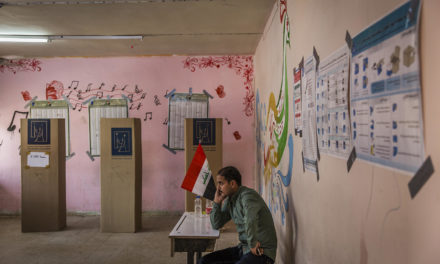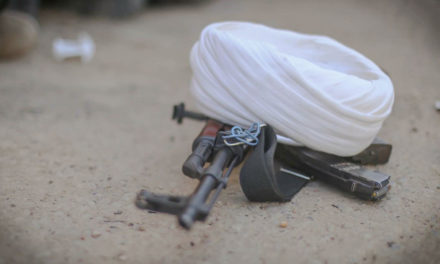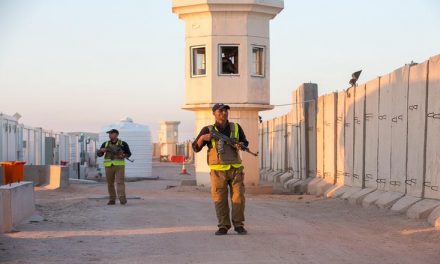(Photo: Hadi Mizban/AP)
Since the territorial defeat of Da’ish (otherwise known as so-called Islamic State) in 2017, the city of Baghdad has witnessed the lowest incidence of terror attacks since the American-led invasion of Iraq in 2003. In fact, major attacks had become something of a rarity. That came to an end on January 21 when a twin suicide bombing ripped through a market in the bustling Tayaran Square area of central Baghdad.
According to the Ministry of Health, at least 32 civilians were killed and 110 wounded from the attack. Reports suggest that a suicide bomber feigned illness and detonated himself after a crowd gathered to help him. As more brave civilians rushed to help those wounded by the initial blast, another suicide bomber detonated himself among an even larger crowd. Da’ish terrorists in Iraq and Syria have deployed this despicable tactic on numerous occasions.
The timing of this attack raises many questions. Taking place on day two of the Biden administration, it evokes fears that Da’ish sleeper cells have received instructions from their command structure to begin a new terror campaign with the aim of testing the appetite of the new American administration to wade back into Iraq’s war against terrorism. This comes against the backdrop of the ongoing withdrawal of American and Coalition troops from Iraq, a process that was initiated by the Trump administration mainly in response to growing political pressure from inside Iraq.
It is an inescapable fact that Da’ish greatly benefitted in its early days from the indifference of the Obama administration to respond to requests for help by the Maliki government in 2014. The inaction by Obama (and by extension Vice President Biden), allowed Da’ish to lay claim to massive swathes of territory in Iraq and Syria before the U.S.-led Coalition was formed to tackle the so-called ‘caliphate’.
It would not be inappropriate to suggest that the twin bombing in central Baghdad is simply Da’ish exploiting an opportune moment to strike at the heart of Iraq after a long hiatus. If that is the case, then only time will tell if this is a one-off lapse in security. However, if today’s attack is the beginning of a more frequent chain of attacks in major Iraqi cities, followed by minor assaults on other key targets across the country, it will undoubtedly signal the start of a new campaign by Da’ish, with the primary objective of probing the capabilities of Iraq’s military and the response of the Biden administration to a new phase of Da’ish operational activity.
Such a new campaign will have the added component of embarrassment for both the Iraqi government and the U.S. military, who have lauded the defeat of Da’ish, especially with foreign troop withdrawals under way. It would force new negotiations regarding how to deal with a new Da’ish resurgence and a discussion about maintaining a foreign troop presence in Iraq to oversee the Iraqi military’s response to new Da’ish attacks. This would inevitably lead to uproar amongst the pro-Iran section of the Iraqi political sphere, which views the withdrawal of foreign troops as a gigantic victory for their brand, the result of years of political and military pressure.
Questions must also be raised about how the terror cell that carried out the bombing was able to do so. Since 2017, Iraq’s intelligence and counter-terrorism agencies have sustained a valiant effort across Baghdad and the rest of the country to identify and neutralise Da’ish legacy networks and prevent the formation of new sleeper cells in and around major cities. These efforts have led to the dismantling of hundreds of Da’ish cells in Baghdad, Anbar, Salahuddin, Diyala, Ninawa, Kirkuk and Babil provinces.
During the height of the protest movement that began in October 2019, and throughout the tumultuous and bloody months that followed, Da’ish seemed to be unable to exploit the bloodshed between protestors and political factions in Baghdad and southern Iraq. Or perhaps they chose to sit back and let their enemies consume each other. However, even as the protest camps waned in number and the movement seemed to burn itself out, Da’ish still seemed unable to carry out attacks that would have poured fuel on an already raging fire.
It is ridiculous to assume that hundreds of successful operations by Iraq’s counter-terrorism and intelligence services have not dealt serious damage to Da’ish capabilities over the last few years. However, the Tayaran Square bombings serve as a tragic reminder of the carnage that Da’ish terrorists remain capable of unleashing on innocent Iraqis. The Iraqi government and military must seriously investigate the lapses in security that led to the bombings and prepare a fresh set of operations to bolster the security of Baghdad and other major cities in the face of the possibility of a new Da’ish terror campaign.
If the hypothesis is correct that the Tayaran Square bombings are the beginning of a series of attacks aimed at probing Iraqi defences and the Biden administration’s willingness for a new confrontation against Salafist terrorism, the mistakes of the past must be revisited, studied and not repeated.
The Iraqi military today is inherently different to the one that collapsed in 2014 and much more capable. However, any hesitation by the Biden administration and the international community to confront Da’ish again will prove to be just as catastrophic as the Obama administration’s initial reluctance to join the fight against Da’ish.
As for the dozens of Iraqi families who were ripped apart by today’s bombings, we can only pray for them to feel reprieve and find patience as they suffer the kind of pain that so many other Iraqis know only too well.

Haidar Sumeri
Haidar Sumeri is a Middle East observer, mainly focusing on Iraq’s war on terrorism.










